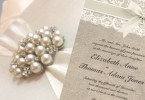Wedding invitation etiquette can be a sticky one especially if there are divorced parents involved but don’t worry there are a few easy rules to follow so that you get your wedding invitation wording etiquette just right for the occasion.
In olden times the bride’s parents paid for the wedding so the invitations would be issued to them but now it could be the couple themselves or both sets of parents who are paying so you’ll need to agree between yourselves who is to issue the invitations.
Casual Wedding Invitation Wording
This will vary a bit depending on whether parents are issuing in the invitation or whether the couple is doing so but, in general, this style is acceptable:
“John Brown and Sally Smith would like you to help them celebrate their marriage” then don’t forget the basic information about the wedding:
Date, time and location of the wedding
Time and location of the reception (or evening party as appropriate)
Where to reply to
If Sally’s parents are issuing the invitation then the wording would read James and Jennifer Smith would like you to help them celebrate the marriage of their daughter Sally to John Brown or similar.
Casual wedding invitation wording can include song lyrics, poetry or anything else the couple want.
Formal Wedding Invitation Wording
Wedding invitation wording etiquette says that a formal wedding invitation should read as follows:
Mr. & Mrs. James Smith
request the pleasure of your company
at the marriage of their daughter, Sally
to John Brown
at Holy Trinity Church, Burton
on Saturday 21st October, 2012 at 11:00am
and afterwards at the Queen Victoria Hotel, Christchurch
RSVP The Cottage, River Road, Burton
Now we’ll look at the wedding invitation etiquette if either set of parents is divorced or re-married. What do you do about step-parents? Do they expect a mention? Are you going to offend someone if you get this wrong? Here are some suggestions but in the end you’ll need to avoid hurting anyone’s feelings so just do what you think is right.
Sally’s parents are divorced, but neither has remarried and are both hosting the wedding:
Use the format above or if they prefer it, list Sally’s mother’s name on the first line and her father’s on the second.
Sally’s parents have both remarried and are jointly hosting the wedding. Sally may wish to break with tradition and mention her step parents in which case Sally’s mother and her husband’s names should be on the first line with her father and his new wife’s name on the second.
Neither of Sally’s parents is living:
The invitation should be issued by whichever family member is hosting the wedding or by the couple themselves.
The Groom’s parents are issuing the invitation:
Use the wording as above but include the bride’s surname: i.e.
Mr. & Mrs. Peter Brown
request the pleasure of your company
at the marriage of Sally Smith
to their son John
The couple are paying for their own wedding:
They may still wish to issue the invitation on behalf of Sally and/or John’s parents or if not, they use their own first and last names.
Requesting a charity contribution rather than a gift:
It is very poor wedding invitation etiquette to even mention gifts but most invited guests will enquire if there is a wedding gift list. The other members of the wedding party should be encouraged to put the word around as to what the bride and groom would prefer.
Children are not invited to the wedding:
This is very difficult indeed and again should not be mentioned on the invitation. Invitees should actually realise that if their children aren’t mentioned by name on the invitation then they’re not invited, but they probably won’t. Friends of the bride and groom may not appreciate that you don’t look at their little darlings quite as they do but be firm. Friends with children should be telephoned and politely told that children cannot be catered for. If they are offended, then that’s unfortunate.






